Python tutorial covers both fundamental and advanced Python ideas. Our Python training is suitable for both beginners and experts.
Python is an object-oriented programming language that is simple, general-purpose, and high-level.
Python is also an interpreted programming language. The creator of Python programming is Guido Van Rossum.
Installation, control statements, Strings, Lists, Tuples, dictionaries, Modules, Exceptions, Date and Time, File I/O, Programs, and more are all covered in our Python lesson. Python interview questions are also provided to assist you in better understanding Python programming.
If you want to learn more about Python and build a career in Python, you should take Python Training.
What is Python? Python is a dynamic, high-level, and interpreted programming language with a wide range of applications. It facilitates the development of applications using an object-oriented programming style. It is simple and straightforward to learn, and it has numerous high-level data structures.
Python is a scripting language that is simple to learn but powerful and diverse, making it ideal for application development.
Python's syntax, dynamic typing, and interpreted nature make it suitable for scripting and quick application development.
Python supports a variety of programming techniques, including object-oriented, imperative, functional, and procedural.
Python is not designed for a certain task, such as web development. Because it can be used with online, enterprise, 3D CAD, and other applications, it is regarded as a multipurpose programming language.
Because variables are dynamically typed, we don't need to specify data types to declare them; instead, we may write a=10 to assign an integer value to an integer variable.
Python allows for quick development and debugging because there is no compilation stage in the development process, and the edit-test-debug cycle is quite short.
